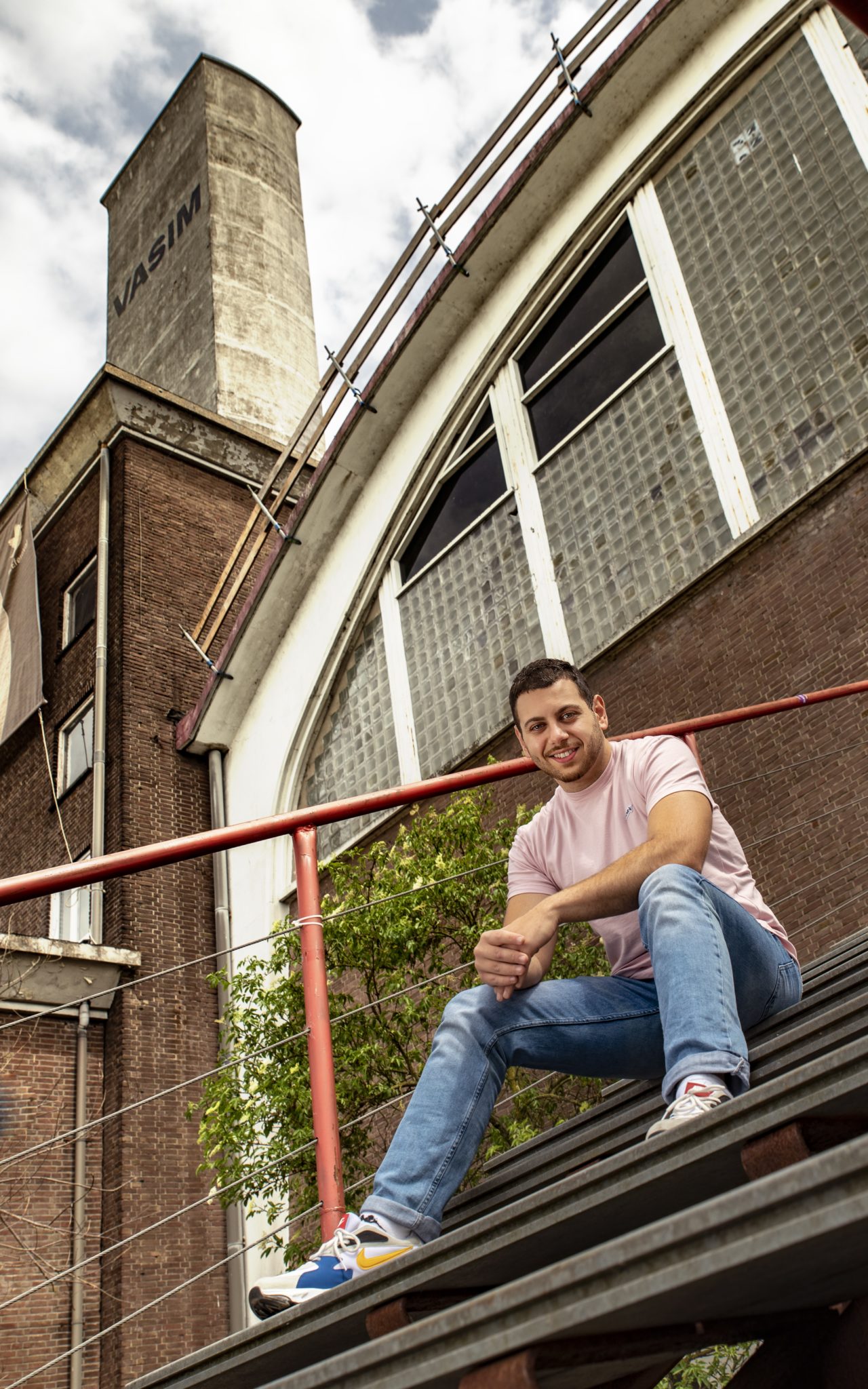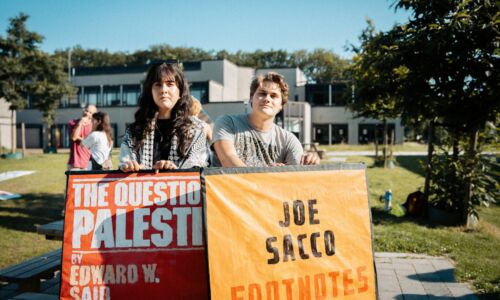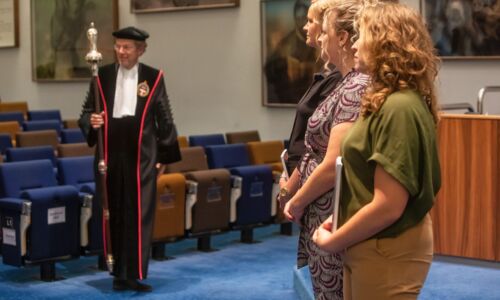This campus poet won’t be put in a box
-
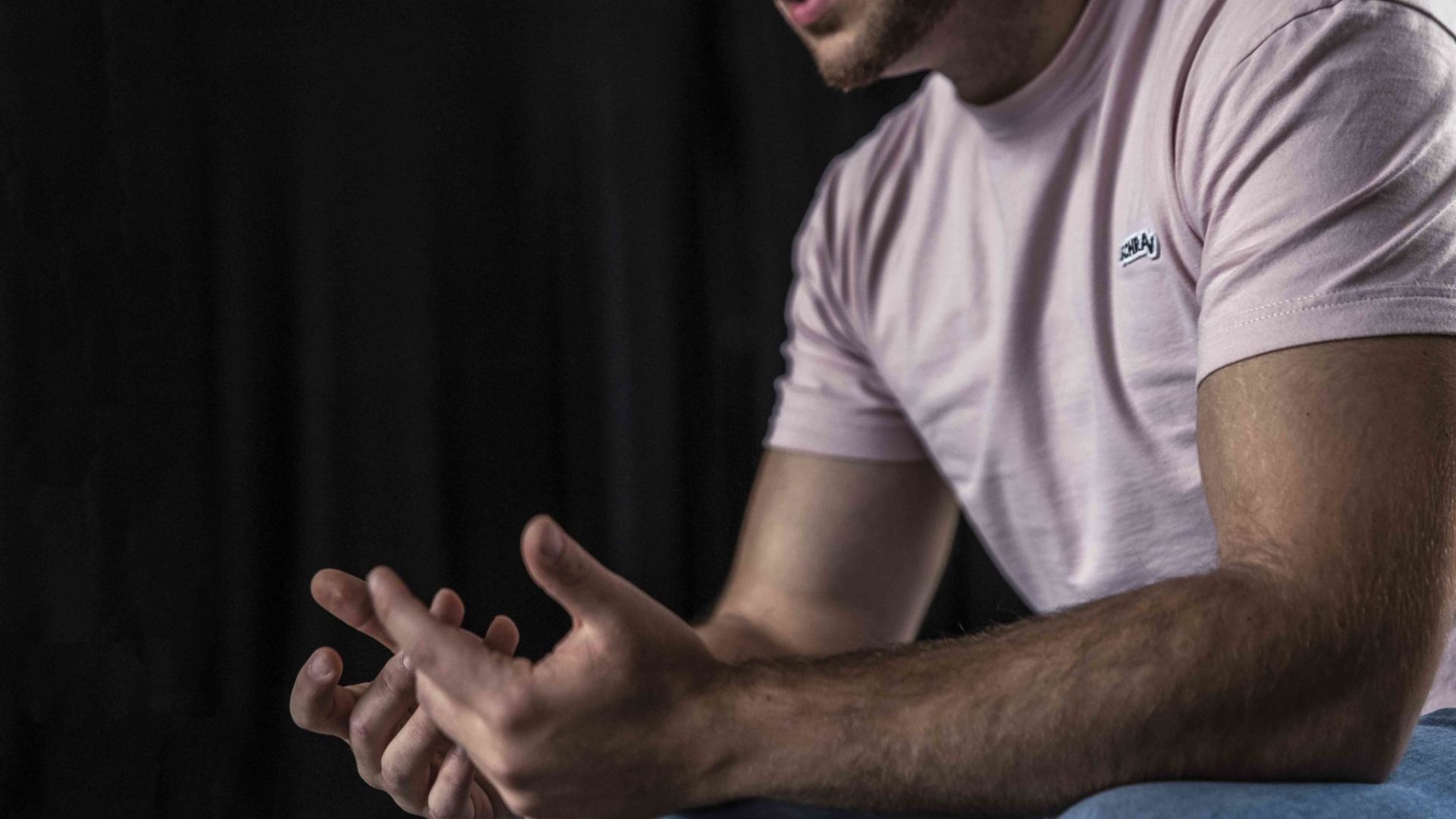 © Julie de Bruin
© Julie de Bruin
He’s a philosopher, spoken word artist, and Campus Poet. He’s also the son of migrants, and grew up in Presikhaaf, a disadvantaged neighbourhood in Arnhem. Lev Avitan evades categorisation. ‘In my first year, I was hyper aware of how white the University is.’
‘By the way…’ says Lev Avitan. We’ve completed the interview and are walking back to our bicycles, parked on the South side of the Vasim, cultural breeding ground at the foot of the Oversteek. ‘Could you use my exact words and formulations in your article?’ To the Philosophy student and spoken word artist language is a tool, a way to describe the world and peel arguments down to their core. Preferably with razor sharp precision. Choice of words matters.
Avitan makes a striking impression, even for a Philosophy student. Tanned skin, a light orange shirt that fits his body like a glove and displays the tattoos on his arms. Not really the standard model student from a Brabant, Limburg or Achterhoek family you usually encounter on Campus. But even for a coloured Dutch person, Avitan has a remarkable background, with an Israeli Jewish mother with Moroccan roots, and a Muslim Turkish father. The 22-year-old Bachelor’s student was born in the Netherlands, and grew up with his mother in the disadvantaged Arnhem neighbourhood Presikhaaf.
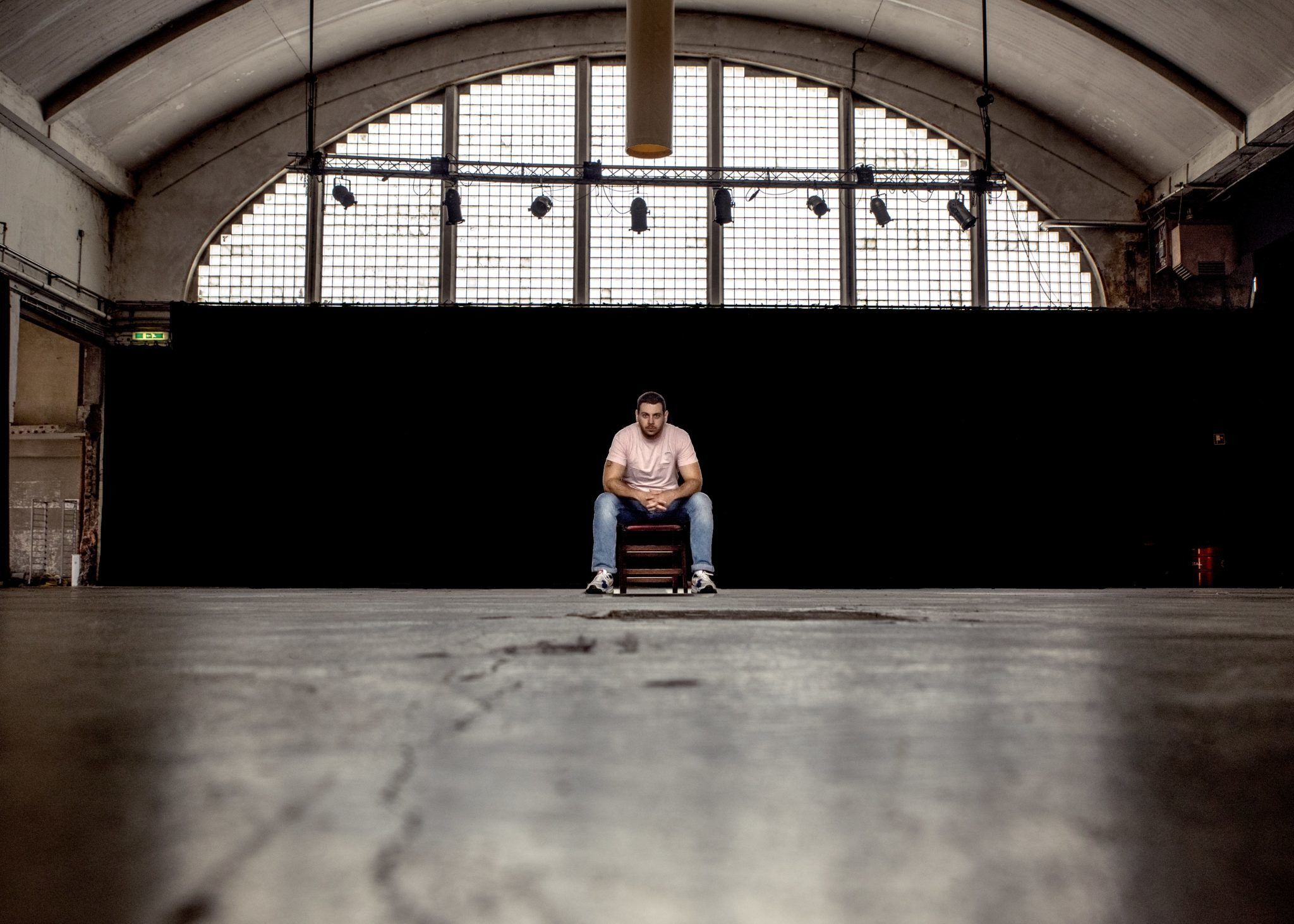
The theme of identity has dominated his entire life, he explains as we walk across the Vasim grounds. It also dominates today’s conversation. He explores this theme as a spoken word artist at Mensen Zeggen Dingen, one of the largest Dutch spoken word collectives. He also frequently performs in Brebl, on the former Honig grounds and – in his role as Campus Poet, at Radboud University.
You have a rather eclectic CV. You studied Music, History, and now philosophy. Is there any logic to it?
‘Ha ha, more than you’d think. At the intermediate vocational school where I followed a programme in Music, I used to make politically oriented hip hop on themes such as racism. My older sister suggested I train as a history teacher, since I was always looking at things from a historical perspective.
Philosophy, which is what I now study at Radboud University, is a natural next step. After all, philosophy is all about questioning the obvious, and I’m constantly questioning things. Why is society the way it is? Where do the dominant ideas come from?’
Your mother is Jewish, your father a Muslim. Are you religious?
‘My mother followed the Old Testament, my father the Quran. Neither of them imposed their religion on me. I’m not religious; I rely on other things to give me strength. I do draw inspiration from religious texts. The Bible, for example, says we’re all equal – we simply have different capabilities.’
You grew up in a difficult neighbourhood. Do you feel at home at a largely white university like Radboud University?
‘In my first year I was hyper aware of how white Radboud University is. I used to wear joggers because I thought they looked cool. But then I saw people thinking: Who is this guy? Why does he walk around dressed like that? I soon adjusted my clothes, because I didn’t want to feel judged. It was clearly self-censorship. These days I again choose my own style.’
Did you manage to find your place in Nijmegen?
‘In the end, yes. Mostly thanks to Brebl, where I could grow as a poet, and Mensen Zeggen Dingen, which supported me in this process. I can see that my poems make people think.’
‘When friends imitate my accent, I feel they don’t take me seriously’
Last year you appeared at the Down the Rabbit Hole festival. You shared that a club had once denied you entrance because of how you looked. How can you know that for sure?
‘This is exactly what my Dutch fellow students always ask! They cannot imagine this kind of discrimination, because they’ve never experienced it. So they trivialise it, and conclude it must be something else. And that while people with a similar background are quick to recognise themselves in my experience. They say: Why would you even try to get into that kind of club? This is where you can see how the environment in which you grow up colours your perspective on the world.’
You could also say: Don’t take it so personally! After all, ours is a country of equal opportunities. You are living proof of this: a boy from a disadvantaged neighbourhood can also make it to university.
‘People who say such things have never been victims of racism. It’s about the little things, like not being hired for a job because your name sounds foreign. Here’s another example: my friends with Dutch roots sometimes imitate my accent, even when I produce perfectly grammatical sentences. They don’t mean to be offensive, but it really upsets me. I feel they don’t take me seriously. These kinds of experiences make people with a nonDutch background hyper aware of their accent. This leads to some people not wanting to ask questions during lectures. At some point, they might think: if I’m not going to ask questions anyway, why bother going to lectures or work groups? This is how people end up being excluded.’
Where do you think prejudice and racism come from?
‘People no longer work together across all social layers. Everyone is stuck in their own conclave, their own little bubble. Our physical spaces exacerbate this: the Campus is for academics, white people who live in the same kinds of neighbourhoods. Within companies too, design and production are implemented in separate departments, by people with different levels of education – because economically, it’s the most efficient approach.’
How would you go about changing this?
For the first time in our conversation, the ebullient Avitan falls silent for a moment. ‘This is the key question in all social movements. Everyone has a coloured perception, including me. It starts with people being aware of what’s going on, but obviously this doesn’t just happen by itself. When you confront people with their behaviour directly, you get resistance. People feel they need to justify themselves. I think what works best is bringing people together physically. When different layers of society meet from a young age onwards, they’re more likely to be open to mutual understanding, and this works to counteract these kinds of undesirable ideas and behaviour.’
Can the University contribute to this in some way?
‘Absolutely! I’d say: collaborate more directly with universities of applied sciences and intermediate vocational institutions, which will make it easier to reach a wider and more diverse group of people. Now university students rarely meet students from universities of applied sciences and intermediate vocational institutions, even if they’re working on the same topic, for example in more technical study programmes. This lack of contact leads to university students being dismissive of ‘lower-level’ study programmes.’
‘Everyone has a coloured perception, including me’
‘I noticed this at the university of applied sciences where I completed my teacher training programme. The lecturers told us: in vocational schools, you just have to focus on being a good teacher. If you want content-related discussions, you need to go to the higher levels. This is just ridiculous. As if one cannot have an in-depth discussion with vocational education students!’
But aren’t diversity and accessibility already prominent on the University’s agenda?
‘On paper perhaps. But I say: practise what you preach. I sometimes feel the Executive Board enjoys talking about diversity, but they’re reluctant to put effort into it. Look at the decolonisation of the curriculum (taking a less white perspective on subjects such as history, politics, Eds.). Neither asap nor Akkuraatd made a point of it in their electoral programmes for the Student Council. Apparently this is such an unheard issue at Radboud University, it’s not perceived as a point for discussion.’
So we need more self-reflection.
‘Yes! We also need to be more critical of the content of our study programmes. Think about how these curriculums impact what students end up doing later. What is the added value for society of study programmes such as fiscal economy, which only helps corporations evade taxes? Or of marketing students who are really good at convincing customers to buy unhealthy products?’
What does your ideal society look like?
‘My goal is a sustainable future for as many people as ‘possible. For our environment to become liveable again because our economies no longer focus on unlimited growth, but on the wellbeing of people and nature. Where people can thrive because they have access to education, health care and safety, with as high a standard of living as possible.’
‘Now university students rarely meet students from hbo and mbo’
I think anyone would endorse that. Will you be the one to solve these problems?
He laughs. ‘Yes, these are major problems. My old friends from Presikhaaf, who now work as car mechanics or postmen, help me keep my feet on the ground. ‘Do you even believe what you say?’ they ask me. ‘You use such big words, Lev!’’
He suddenly turns serious again. ‘Just the other day, a friend said to me: only when there is blood on the street will people be prepared to change their life. And I answered: but there’s already blood on the streets, maybe not here, but elsewhere, from victims of climate change. Like the hurricanes in Mozambique this Spring. If we were to really recognise diversity, we would see that these people are the same as us, that their blood is our blood.’
